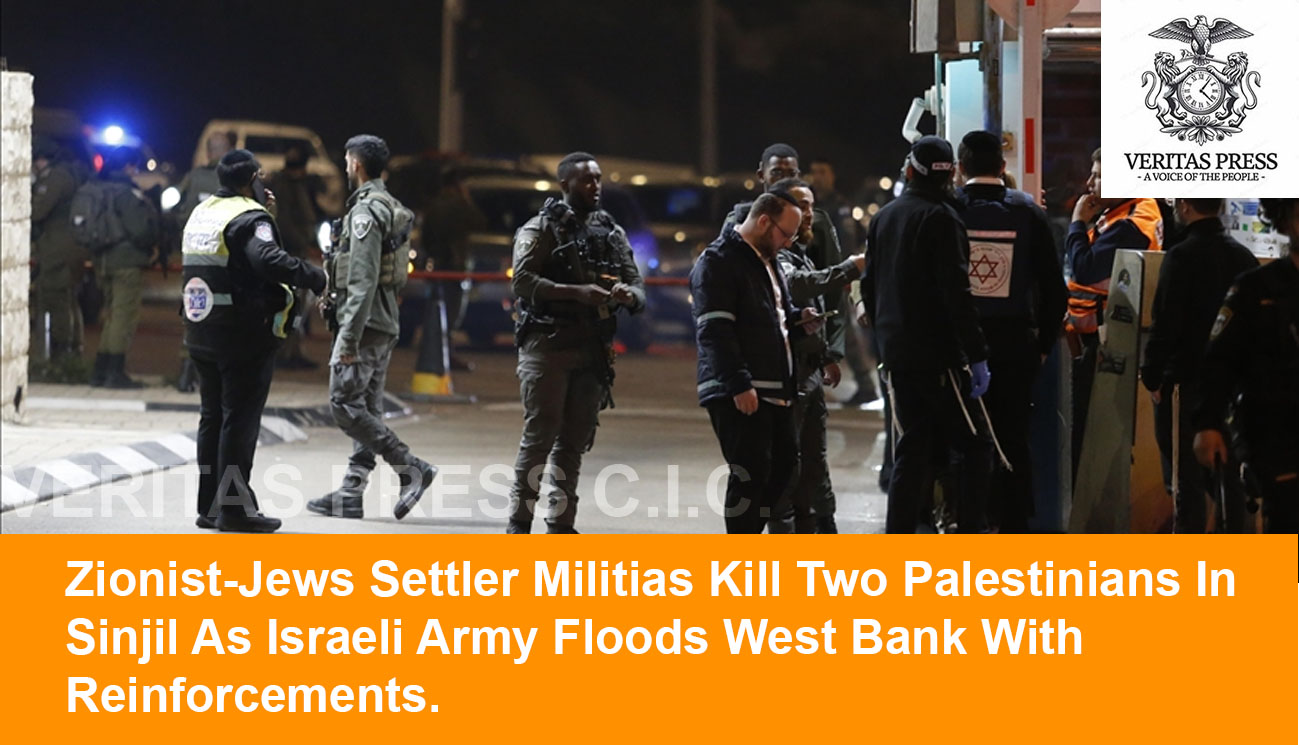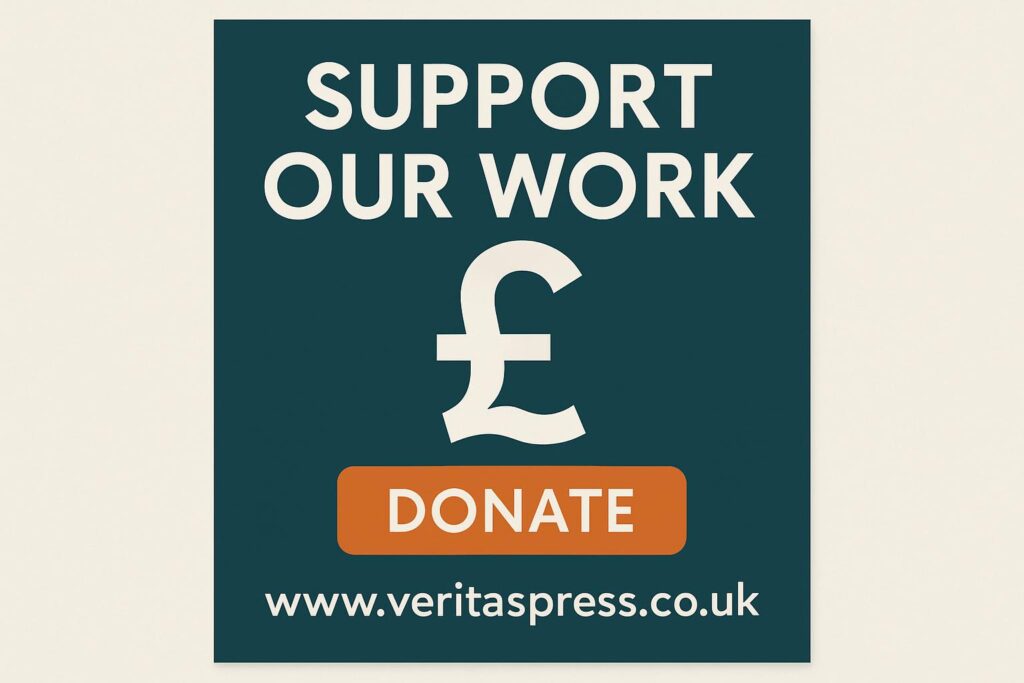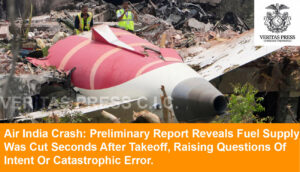Coordinated settler-military campaign intensifies amid Israel’s broader war; rights groups warn of “ethnic cleansing in slow motion”
Occupied West Bank – A brutal settler assault backed by Israeli soldiers left two Palestinians dead and over 40 others injured on Friday in the central West Bank town of Sinjil, in what rights groups and analysts describe as a calculated campaign of terror designed to displace Indigenous Palestinians under the cover of war.
The victims were identified as 23-year-old Muhammad Shalabi and Saif Eddin Kamel Abdul Karim Muslat, a Palestinian-American dual citizen. Muslat was reportedly beaten to death by Israeli settlers, while Shalabi was shot in the chest and left to bleed for hours, according to the Palestinian Health Ministry.
“The young man was injured and remained so for four hours. The army prevented us from reaching him and did not allow us to take him away,” said Abdul Samad Abdul Aziz, a resident of al-Mazra’a ash-Sharqiya and a relative of Muslat, in comments to WAFA News Agency. “When we finally reached him, he was taking his last breath.”
Eyewitnesses say the attack began after settlers, armed with clubs, rifles, and tear gas, ambushed Palestinians protesting the erection of a new outpost on village land. Videos circulating on social media show masked settlers, some dressed in army fatigues, hurling stones, torching olive trees, and blocking ambulances from reaching the wounded.
The Palestinian Red Crescent confirmed that its medics were physically obstructed by settlers in forested areas around Sinjil, and that several of the injured suffered blunt-force trauma to the head. The injured were eventually evacuated to hospitals in Ramallah and Nablus, but only after delays that may have cost Muslat his life.
According to Al Jazeera, residents from Sinjil and neighbouring al-Mazra’a ash-Sharqiya are still searching for at least one missing person believed to be abducted or hiding in the woods. The chaos and uncertainty have gripped the town with fear.
In response to the escalating unrest, the Israeli army announced the deployment of two additional battalions to the West Bank. But far from protecting Palestinians, these reinforcements appear to be enabling more violence.
“Organized State-Settler Violence”
The Palestinian Resistance Movement Hamas condemned the killings, calling them part of a “systematic campaign of displacement.” In a statement Friday, the group said the blood of Saif al-Din Muslat would be “a curse on the occupation and its settlers,” and urged mass mobilisation across the West Bank.
“This is not just settler violence; this is state-sponsored terrorism,” said Issam Aruri, director of the Jerusalem Legal Aid Centre. “The settlers act with impunity because they know the army is there to back them up, not stop them.”
Indeed, rights groups have long documented how the Israeli military not only fails to stop settler attacks but often facilitates them directly. According to the Colonisation and Wall Resistance Commission, Israeli settlers, many of them from paramilitary-style “youth hilltop” groups, have launched over 2,150 attacks in the first half of 2025 alone, killing at least four Palestinians.
“These attacks are part of a long-standing Israeli strategy to forcibly depopulate Area C,” said Dr. Randa Wahbe, a policy analyst at Al-Shabaka. “The war in Gaza has provided cover for an accelerated campaign of de facto annexation and ethnic cleansing in the West Bank.”
Violence Spreads: Settlers Erect New Outposts.
In Sa’ir, north of Hebron, settlers erected a new tent outpost on Jabal al-Hadib hill, reportedly the first step toward establishing a full-scale illegal settlement. According to Bassam al-Qawasmeh, one of the landowners, settlers had already fenced off hundreds of dunums of private land, barring Palestinian access under army protection.
“Everything happening here is with the backing and incitement of the Israeli government,” al-Qawasmeh told Ma’an News Agency. “They seize a small area first, then expand gradually and expropriate thousands of dunums.”
This tactic, gradual encroachment under military protection, has become a blueprint for settlement expansion across the West Bank. Just days earlier, settlers erected another outpost on Jabal al-Jumjuma, north of Hebron, complete with mobile homes and an Israeli flag.
The UN Office for the Coordination of Humanitarian Affairs (OCHA) and Israeli watchdog group Peace Now have repeatedly warned that such outposts are established without legal authorisation, yet rarely dismantled. Instead, they are often retroactively legalised by the Israeli government, further entrenching the occupation.
A U.S. Citizen Killed, Silence From Washington:
The death of Palestinian-American Saif al-Din Muslat has raised alarm among U.S.-based rights groups, though the U.S. State Department offered only a perfunctory statement: “We are aware of the reports of the death of a U.S. citizen in the West Bank. We offer our condolences but will not comment further.”
“This is disgraceful,” said Laila El-Haddad, a U.S.-based Palestinian analyst and former journalist. “An American citizen was lynched by settlers, and Washington can’t even call it out? If this had happened anywhere else, it would be an international scandal.”
The Biden and Trump administrations have both come under fire for unwavering military and diplomatic support to Israel, despite mounting evidence of war crimes in Gaza and systematic violence in the West Bank.
Meanwhile, In Masafer Yatta And Bethlehem:
Friday’s violence was not confined to Sinjil. In Al-Minya, east of Bethlehem, settlers attacked homes under military escort, while the army fired tear gas at residents. Medical workers reported several suffocation injuries, and one 3-year-old girl was struck in the head by a settler, requiring emergency treatment.
In Masafer Yatta, a region targeted for mass displacement by the Israeli military, settlers stormed Palestinian homes and beat residents, injuring two young men. The area, home to over a dozen herding communities, has been under siege for months, with Israel seeking to forcibly remove over 1,000 residents.
“This is ethnic cleansing in slow motion,” said Yumna Patel, Bethlehem-based correspondent for Mondoweiss. “It is happening village by village, hilltop by hilltop, and the world is still looking the other way.”
A War on Two Fronts:
The spike in violence in the West Bank is unfolding as Israel’s genocidal war on Gaza enters its tenth month. According to the Palestinian Health Ministry, more than 195,000 Palestinians have been killed or injured in Gaza since October 7, 2023, including over 36,000 dead, the vast majority women and children. More than 14,000 are missing, and nearly two million people have been displaced.
In the West Bank, Israeli forces and settlers have killed at least 998 Palestinians and wounded more than 7,000 since the start of the war. Mass arrests and night raids continue, with over 6,000 Palestinians detained, many without charge or trial under Israel’s notorious system of administrative detention.
ICJ Calls For Withdrawal, Israel Expands Instead:
In a landmark advisory opinion issued last month, the International Court of Justice ruled that Israel’s occupation of the West Bank and East Jerusalem is illegal and called for the dismantling of all settlements. But instead of complying, Israel has ramped up outpost construction, land theft, and settler militarisation.
“This is a litmus test for the international community,” said Michael Lynk, former UN Special Rapporteur on human rights in the occupied territories. “If Israel is allowed to ignore the ICJ and double down on settlement expansion, the rule of law itself is at stake.”
For Palestinians in towns like Sinjil, however, the battle is not about international law, it’s about survival.
“We are being hunted like animals,” said Kifah Harb, a resident of the village. “The settlers kill us, the soldiers protect them, and the world watches in silence. But we will not leave our land.”
Top of Form
Conclusion: Settler-Colonial Expansion by Design
What unfolded in Sinjil is not an isolated outburst of violence; it is the direct outcome of a deliberate, state-backed settler-colonial project aimed at the forced displacement of Palestinians and the annexation of land for what Israeli leaders openly call the “Greater Israel” agenda.
Israeli Finance Minister Bezalel Smotrich, himself a settler, has repeatedly declared that “there is no such thing as a Palestinian people,” and has called for the state to “encourage voluntary emigration” of Palestinians from the West Bank, language that human rights experts warn echoes genocidal intent. In March 2023, Smotrich explicitly stated:
“We are here to stay. The entire land of Israel belongs to us. We must erase the village of Huwara, and we must build and settle all the land.”
Meanwhile, National Security Minister Itamar Ben Gvir, head of the far-right Otzma Yehudit party, has pushed to arm settlers, called for the “full occupation” of Gaza, and declared that Jewish supremacy is necessary to preserve the state.
“This land belongs to the people of Israel, and we will never give it up, not an inch,” Ben Gvir told Channel 14 in February 2024. “Our enemies must understand there is no future for them here.”
These statements are not fringe; they reflect the ideological backbone of the current Israeli government, the most far-right in the state’s history. Backed by military bulldozers, retroactive legalisations of illegal outposts, and armed settler militias, this government is not merely turning a blind eye to settler violence; it is actively facilitating a campaign of annexation and erasure.
As the international community wrings its hands and the U.S. continues its billions in unconditional military aid, Palestinians in villages like Sinjil, Masafer Yatta, and Huwara face an existential struggle for survival on their own land.
Human rights groups, from B’Tselem to Amnesty International, have long warned that Israel’s actions meet the legal threshold for apartheid, forcible transfer, and possibly genocide. The events of 2024 and 2025, including the systematic destruction in Gaza and the violent ethnic cleansing across the West Bank, have only made these warnings more urgent.
“This is not a war of defence. It is a war of conquest. And the target is not Hamas, it is the Palestinian people as a whole,” said Omar Shakir, Israel and Palestine Director at Human Rights Watch.
Unless there is decisive international action, sanctions, arms embargoes, and prosecution of war crimes, Israel will continue to expand its settler-colonial frontier, one hilltop, one olive grove, one village at a time. And Palestinians, like those killed in Sinjil, will continue to pay the price in blood.
The question is not whether the world knows what is happening. It is whether it will act, or once again stand by as a nation is dismembered in full view.




























